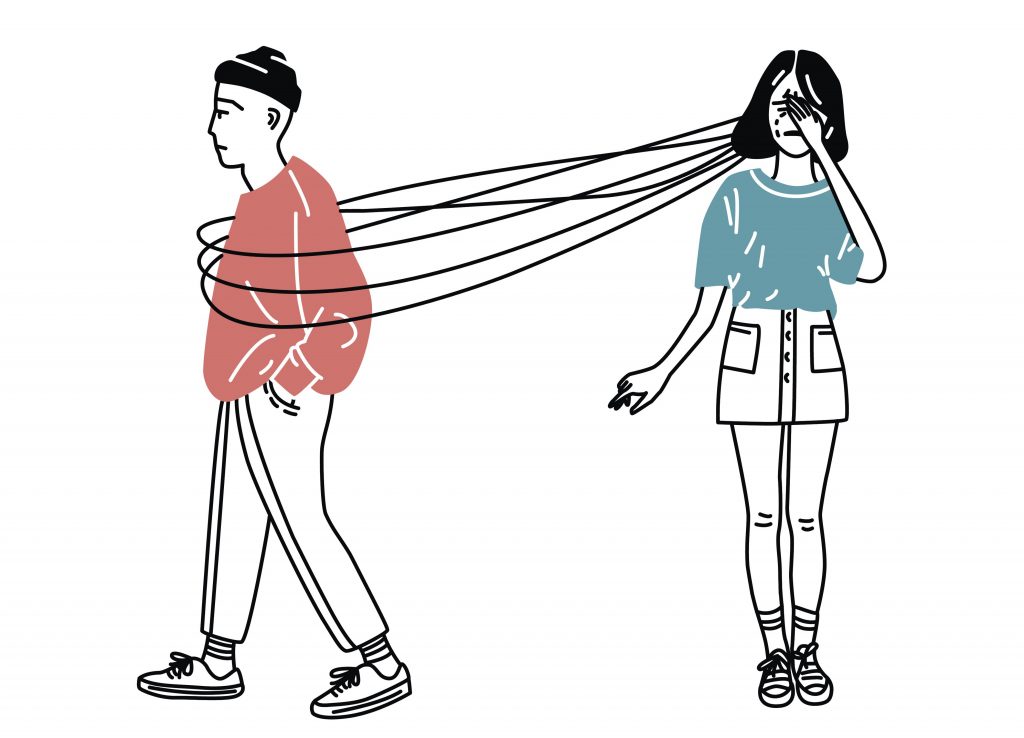What Is Codependency?
Also known as “relationship addiction,” the codependent is addicted to relationships and the validation they get from them. They will do whatever it takes, including sacrificing their own personal needs and well-being, to keep receiving this validation.
Root Cause of Codependency
Codependency is usually rooted during childhood. The child grows up in a home where their emotions are ignored or punished because the parent (or parents) suffer from mental illness, addiction, or other issues. This emotional neglect results in a child having low self-esteem, lack of self-worth, and shame.
Some common characteristics of dysfunctional families:
- Unsafe & unsupported. The non-dysfunctional parent usually becomes the enabler, always standing behind the abusive parent. The children are left to believe they are not worthy of protection.
- Unpredictable. Children are constantly on edge due to the emotionally and mentally unstable parent.
- Manipulative. Children watch as dysfunctional parents control those around them in order to get the behavior they want and need.
- Pitting siblings against one another through triangulation. The dysfunctional parent bad-mouths about one child to another, creating a divide. In an effort to avoid being the loser-child, the children begin to compete with one another for the already limited attention and affection from the dysfunctional parent
- Emotional and/or physical neglect. Children are accused of being selfish for expressing their emotions and punished for inconveniencing others.
- Using shame to control children and keep them in their place. “Getting straight As means nothing because you’re such a bad and ugly girl!”
- Judgmental and setting unrealistic expectations for children. Then constantly raising expectations as the child works hard to reach it, making certain they will never be rewarded. This results in shame, low self-esteem, and feelings of inadequacy.
- Children are blamed for the family’s dysfunction. It’s easier to blame others for your problems than to go in deep and fix it once and for all. Blame is often used to provoke shame, self-doubt, and inadequacy, making it easier for dysfunctional parents to maintain control of their children.
This is highly dangerous for young children as they have not yet developed the ability to identify unhealthy relationships. Kids don’t know their parents are not always right, nor do they suspect their parents are manipulative. They can’t even think that mom and/or dad are unable to provide them with a secure foundation on which they can confidently grow. Thus, children of dysfunctional families believe they are unlovable, stupid, unworthy, crazy, and always at fault. The child also learns to associate the self-sacrificing and care-giving roles with temporary feelings of stability and control.
Common Characteristics of Codependents
- You are hyper-aware of other people’s needs so you become a caretaker to avoid being blamed for other people’s unhappiness and/or to feed your self-esteem by making them happy.
- You believe that love and pain are synonymous. This becomes a familiar feeling so you continue to allow friends, family, and romantic relationships to behave poorly and treat you with disrespect.
- Your self-esteem and self-worth are dependent on those you are trying to please. Your self-worth is based on whether or not other people are happy with what you can do for them. You over-schedule yourself with other people’s priorities to prove you are worthy.
- You people-please. As a child, having a preference or speaking up resulted in being punished. You quickly learned that letting others have their way spared you from that pain. You’re afraid to upset or disappoint others, which often leads to over-extending yourself to avoid negative feedback.
- You always put others’ needs before your own. You feel guilt if you don’t follow through even if it means sacrificing your well-being. You ignore your own feelings and needs, reasoning that others are more deserving of your time and help.
- You lack boundaries. You have trouble speaking up for yourself and saying NO. You allow people to take advantage of your kindness because you don’t want to be responsible for their hurt their feelings.
- You feel guilty and ashamed about things you didn’t even do. You were blamed for everything as a child, so you continue to expect everyone to believe this about you now.
- You’re always on edge. This is due to growing up in an environment lacking security and stability. While healthy parents protect their children from harm and danger, dysfunctional parents are the source of fear for their children and distorts their self perception.
- You feel unworthy and lonely. You were always told you are not good enough and everything is your fault. The dysfunctional parent conditioned you to believe that you are of no value to anyone, leaving you with no one to turn to.
- You don’t trust anyone. If you can’t even trust your own parents, who can you trust? Your unhealthy childhood conditioning lead you to believe that you do not deserve honesty or to feel safe.
- You won’t let others help you. You’d rather give than receive. You try to avoid having to owe someone for the help they give you, or have the favor used against you. You’d also rather do it yourself because others can’t do it your way.
- You are controlling. You were conditioned to believe that you are a “good boy/girl” if those around you are OK. So when life feels overwhelming, you try to find order by controlling others instead of fixing what needs repairs in your own life.
- You have unrealistic expectations for yourself as a result of the harsh criticism you constantly received as a child.
- You complain about how unhappy your life has become then quickly take it back to protect your ego, trapping you in an unending cycle of complain/deny.
- You melt into others. You have difficulty separating yourself from other people’s feelings, needs, and even identities. You define your identity in relation to others, while lacking a solid sense of self.
- You are a martyr. You are always giving without receiving, then feel angry, resentful and taken advantage of.
- You are passive-aggressive. You feel angry and resentful and complain about “having to do everything” – while you continue doing everything on your own.
- You fear criticism, rejection, and failure so you procrastinate on your own dreams and goals. Instead, you manage and control people’s plans and extract fulfillment when they succeed.
These self-destructive thoughts, emotions, and behaviors are based on distorted beliefs that developed as a result of emotional abuse during your childhood. As a helpless child, it was necessary to adapt these behaviors in order to survive.
Statements of Truth to Help Support Recovery
1. I have the right to my own thoughts, feelings, and values. You don’t have to be like everyone else. And you don’t have to always agree with everyone else. You are your own person and entitled (just like everyone else) to your own sense of self. Don’t let differences in opinions make you feel like you’re wrong. Your true friends and family will still love you whether or not they agree with anything you do or say!
2. The only person I have control over is myself. When you take control of other people, you’re taking away their right to their own thoughts, feelings, and behaviors – that’s not fair. Shift your focus back on yourself and get to know yourself better. It’s time to discover what YOU want and need in life!
3. I don’t have to own other people’s issues. Just as it’s no one else’s responsibility to fix your problems, it’s not your responsibility to solve anyone else’s. Let yourself off the hook and work on being your best self instead!
4. Saying NO does not make me selfish or unkind. There is nothing wrong or mean about declining, refusing, or disagreeing. No is a way you communicate your preference – just like answering, “Yes.” That’s it. It’s understandable if the person you are answering to is disappointed, but it’s their responsibility to get over it. Those who flatly refuse to accept your decision needs to step back and work on their own boundaries.
5. I deserve to be just as kind to myself as I am to others. You are worthy of as much love, kindness, and compassion as the most celebrated people on our planet. Do not allow anyone to convince you that you deserve less. Those suggestions usually come from people with hurtful intentions.
6. I don’t have to sacrifice my well-being to care for others. You have the right and responsibility to care for and protect yourself in order to continue performing at your highest capacity. This not only benefits you, but those who depend on you. Because when you’re at your best, you can better care for those around you.
7. My self-worth isn’t based on external approval. Self-worth is the value you place on yourself. it’s completely independent of what anyone else thinks about you or what you can do for anyone else. So take a deep breath and appreciate the heck out of who you are!
8. Having my own preferences and choosing what feels right for me is not selfish. Codependents tend to believe doing what’s right for them is selfish. This is why setting and enforcing boundaries is necessary. Healthy boundaries give you a safe place to comfortably step into your authentic self!
9. I can be loved simply for who I am. You don’t have to fit into everyone’s mold in order to be loved. That’s not real love – it’s being loved for who you appear to be. There’s nothing wrong being an acquired taste. Relax and be yourself. This will draw in people who genuinely appreciate and love you.
Conclusion
As a child, you were at the mercy of your dysfunctional parents and caregivers. However, as an adult, you no longer have to live in fear as you did when you were a child. Keep reminding yourself that your parents’ shortcomings are not for you to own. You don’t have to constantly convince others that you are worthy anymore. Learn to communicate your truth and who you really are, because you deserve to feel happy, safe, and valued just like everyone else!

